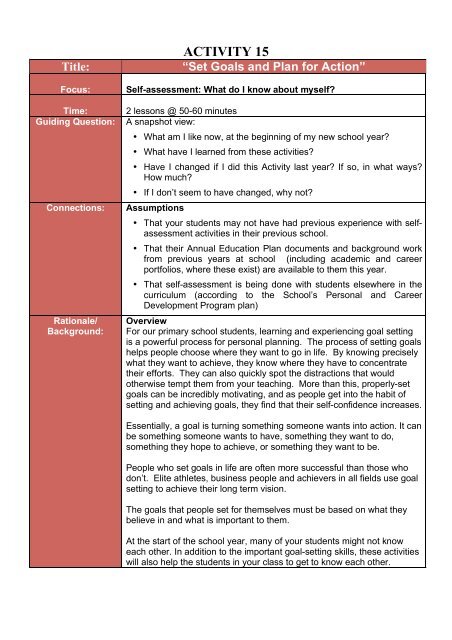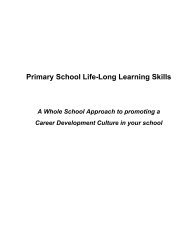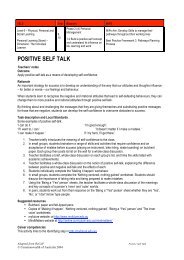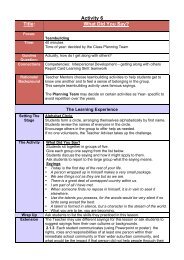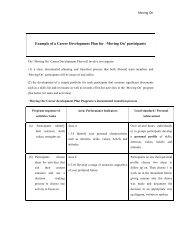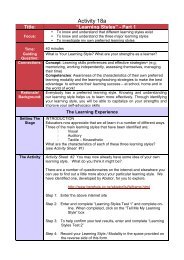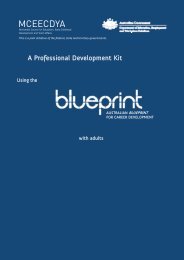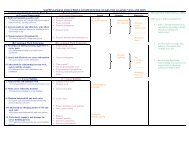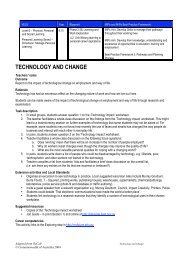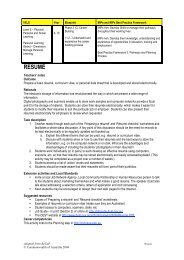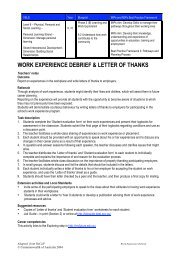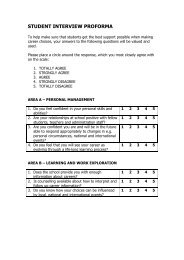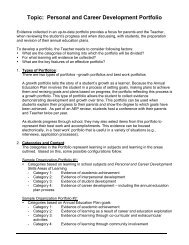Set_Goals_Plan_ Action - Blueprint - Australian Blueprint for Career ...
Set_Goals_Plan_ Action - Blueprint - Australian Blueprint for Career ...
Set_Goals_Plan_ Action - Blueprint - Australian Blueprint for Career ...
Create successful ePaper yourself
Turn your PDF publications into a flip-book with our unique Google optimized e-Paper software.
Title:Focus:Time:Guiding Question:Connections:Rationale/Background:ACTIVITY 15“<strong>Set</strong> <strong>Goals</strong> and <strong>Plan</strong> <strong>for</strong> <strong>Action</strong>”Self-assessment: What do I know about myself?2 lessons @ 50-60 minutesA snapshot view:• What am I like now, at the beginning of my new school year?• What have I learned from these activities?• Have I changed if I did this Activity last year? If so, in what ways?How much?• If I don’t seem to have changed, why not?Assumptions• That your students may not have had previous experience with selfassessmentactivities in their previous school.• That their Annual Education <strong>Plan</strong> documents and background workfrom previous years at school (including academic and careerportfolios, where these exist) are available to them this year.• That self-assessment is being done with students elsewhere in thecurriculum (according to the School’s Personal and <strong>Career</strong>Development Program plan)OverviewFor our primary school students, learning and experiencing goal settingis a powerful process <strong>for</strong> personal planning. The process of setting goalshelps people choose where they want to go in life. By knowing preciselywhat they want to achieve, they know where they have to concentratetheir ef<strong>for</strong>ts. They can also quickly spot the distractions that wouldotherwise tempt them from your teaching. More than this, properly-setgoals can be incredibly motivating, and as people get into the habit ofsetting and achieving goals, they find that their self-confidence increases.Essentially, a goal is turning something someone wants into action. It canbe something someone wants to have, something they want to do,something they hope to achieve, or something they want to be.People who set goals in life are often more successful than those whodon’t. Elite athletes, business people and achievers in all fields use goalsetting to achieve their long term vision.The goals that people set <strong>for</strong> themselves must be based on what theybelieve in and what is important to them.At the start of the school year, many of your students might not knoweach other. In addition to the important goal-setting skills, these activitieswill also help the students in your class to get to know each other.
Teaching PracticeThe Teacher’s Role in Adapting TextbooksKirkpatrick (2011) observed, however, that progress in developing regional varieties of English isbeing impeded by standardized textbooks and other materials currently in use, specificallyAmerican and British texts that largely present native-speaker norms. This is certainly asituation unlikely to change anytime soon, as Tomlinson (2006, p. 131) remarked:. . . all the coursebooks I know which are sold on the global market still use oneof these prestige standards as their model of correctness. It would be a bravepublisher who risked financial failure by publishing a global coursebook with anEIL core or a variety of world Englishes as its model(s).Fortunately, teachers in Cambodia and throughout the ASEAN region need not wait <strong>for</strong> eitherdaring publishers or innovative government policies to start moving toward an ELF multilingualmodel of teaching. Teachers themselves can start by making small adaptations in existing,widely used textbooks. The current reality is, however, that many instructors are hesitant tomake any changes in the textbook, even if their school directors allow it. This hesitancy,Richards suggested, is often based on the following assumptions about textbooks (1998, citedby McGrath, 2002):• Everything in a lesson is equally important <strong>for</strong> students.• Explanations and cultural in<strong>for</strong>mation in textbooks should not be questioned.• Teachers do not have the authority or expertise to adapt textbook lessons.• Activities in a textbook are always superior to those created by teachers.In addition to these beliefs, another factor might limit teachers’ willingness to modify textactivities: lack of experience. However, despite these factors, some Cambodian teachers havecome to recognize that textbook adaptation is not only important, but also achievable, even <strong>for</strong>teachers who have limited classroom experience. As shown below, all teachers can learn tologically, systematically, and simply make changes to their textbook material that willcontribute greatly toward student success in local and international contexts.The WhyWhy and How to Adapt MaterialsOnce teachers have accepted the idea that they can make changes to the text, the decision tochange has to be made based on the content of each activity. While the objective of an activitymay be important <strong>for</strong> students, its presentation might be too simple or uninteresting <strong>for</strong> them.Of course, care is required be<strong>for</strong>e making major changes to textbooks, since doing so couldundermine the student-teacher relationship--students might, <strong>for</strong> example, question the teachers’judgment or resent paying <strong>for</strong> a textbook that is not fully used. Thus, deciding wisely whetherto use an activity (and if so, to use it as is or to modify it) or not to use it (and then whether tosimply omit the activity or replace it with another) (Harmer, 2007) is the key to good textbookadaptation. Furthermore, if a decision has been made to adapt an activity to better meet theneeds of a particular classroom, the teacher must have and be able to articulate a clear ideawhy the material in the text needs to be made better. Among the reasons McGrath (2002) offersteachers to consider when they are contemplating adaptation of material are the following:Chea, Klein, and Middlecamp - Page 220
JOURNALActivity Sheet 2Keeping Track of MyselfMy Strengths, Interest, and Needs (A Self-Assessment Summary)What I like to do – my interests and hobbiesMy interests and hobbies Date YearLevelA brief descriptionWhat I do well – my skillsMy skills Date YearLevelA brief descriptionWhat I need help with – my needsMy needs Date YearLevelA brief description
JOURNALWhat is important to me?My priorities Date YearLevelA brief descriptionAwards, recognitions, and achievements (what others have recognized in me)My achievements Date YearLevelA brief description
JOURNALMy Leadership and Teamwork SkillsMy ActivitiesInclude activities such asjoining our school’sStudent Council,Community Service,participating in Sportsteam(s), Dance lessons,Swimming Lessons, etc.YearLevelDateDescription of the Skills I LearnedExamples could include cooperating,collaborating, team membership, leading,solving problems, and mediating.
JOURNALMy Education Exploration ActivitiesThe Education Opportunities Ihave exploredInclude in my primary school, Sci-Tech, different Museums, ArtGallery, Music and Dramaactivities, Teams and Clubs,YearLevelDateMy Education Exploration ActivitiesDescribe the activities you participatedin (e.g., visiting sites, listening to guestspeakers, searching the Internet,reading books).
JOURNALMy <strong>Career</strong> Exploration ActivitiesThe <strong>Career</strong> Possibilities Ihave thought aboutYearLevelDate<strong>Career</strong> Exploration Activities that I canconsider accessingDescribe how you gathered your in<strong>for</strong>mation(e.g., through an Internet search, at aninterview with people I know about their jobs,through attending a career fair,).
JOURNALMy Co-curricular and Extra-curricular Activities (Learning Outside the Classroom)My Extra-curricularActivitiesYearLevelDateSpecific ActivitiesDescribe what you did.The Teams and Clubs IBelong ToMy AFTER-School jobsat homeThe Courses and Lessons ITook(Include such activities asRed Cross, First Aid,Debating, Drama, Music orDance Lessons, andSwimming Lessons.)My Volunteer Experience(Include volunteer activitiesthat are not <strong>for</strong> pay. EgChurch Group, Red Cross,Environmental Club, foodbank)My CommunityInvolvement Activities


